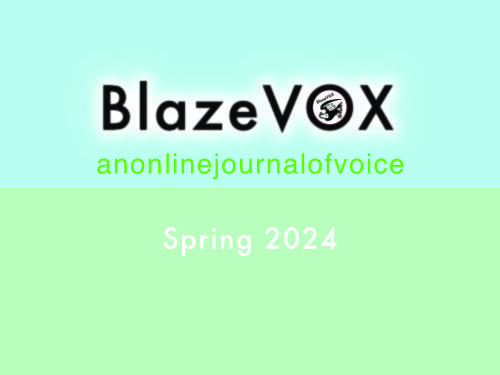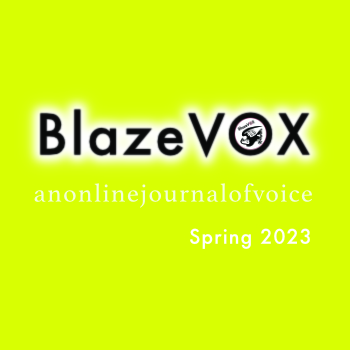IntroductionIntroduction

Spring Matters:
Is it spring yet?
Spring seems to be in the air, but it seems noncommittal. After a long, cold winter we have been sitting on our new issue of BlazeVOX until things started to blossom. But it is now mid May and even though we are not basking in a garden filled with sunshine and birdsong, it is spring and we are ready to roll. In this issue we have 50 poets and 11 fiction works and several creative nonfiction that make a spectacular issue. There are also book previews of 16 our newest books and an interview with Chuck Richardson to round it all off. We hope these fine writings shake out the chilly breezes and help us all remember that tingling feeling of anticipation and expectation.
Rockets, Geoffrey
Poetry
|
|
|
Fiction
Creative Non-Fiction
Acta Biographia: Author Bios
15 Questions: Interviews
THE ELECTRIC AFFINITIES by Wade Stevenson
An atmospheric, evocative tale of youth endeavoring to live free.
—Kirkus Reviews
‘This book reveals, harbors, conceals fraught desire with electrical sparks’
—Ultra Violet
Read Preview here | Explore more here
The Complete Dark Shadows (of My Childhood) by Tony Trigilio
Barnabas Collins, kitsch vampire but source of poet Tony Trigilio’s childhood nightmares, rises from his casket in the first sentence of this intrepid fever chart of a poem. Trigilio manages to create a riveting two-fold narrative—personal and TV-screen ekphrastic—out of piecemeal sentences (one per episode) that honor the most unlikely of poetic subjects: a cheaply produced, blooper-ridden, gothic-horror soap opera. This is just the first installment of what promises to be a classic American coffin-shaped (I hope) epic poem.
—David Trinidad
Read Preview here | Explore more here
Apollo by Geoffrey Gatza
It has often been said that Marcel Duchamp gave up art for chess. Geoffrey Gatza has reversed the process, and produced a sumptuous “souvenir program” of a performance of Stravinsky’s ballet Apollo, framed by an elaborately-plotted chess game between Duchamp and his female alter-ego, Rose Selavy. The results are stunning.
—John Ashbery
Read Preview here | Explore more here
atboalgfpopasasbifl: Irritations, Excrement & Wipes by Jared Schickling
His use of found language, annotations, and visible excisions of text illustrate beautifully the ways in which all writing arises from one’s life as a reader. This is a smart, thought-provoking book by a truly gifted poet.
—Kristina Marie Darling, author of Melancholia (An Essay) and Petrarchan
Read Preview here | Explore more here
CELLULOID SALUTATIONS by Elizabeth Block
It’s all here: love, work, child. And the writing. Mainly the writing. It takes over all these other things and yet it is built out of all these things. This is how Elizabeth Block erases Elizabeth Block, as one poem claims. She does this automatically, animalistically, while wailing forward, gracefully and with improvisation.
—Juliana Spahr
Read Preview here | Explore more here
CRUELTY by Jefferson Hansen
In Jefferson Hansen’s collection of short stories, Cruelty, his assorted strange and confused characters are much like the people who pass through my life any day, only with a more pronounced and interesting strangeness. … The intellectual nimbleness displayed in Hansen’s short stories is not unlike what is told in old allegories and folk and fairy tales.
—Mary Kasimor
Read Preview here | Explore more here
Dear Darwish by Morani Kornberg-Weiss
Morani Kornberg-Weiss addresses the other in perfect awareness of history—that there may be no answer, no personal reconciliation. She proceeds anyhow into the thicket of the past not for the sake of settling accounts but to understand the edges of a possible future. One hopes it is only the first of a series of poets making such engagements.”
—Kazim Ali
Read Preview here | Explore more here
Fantasias in Counting by Sophie Seita
Sophie Seita’s Fantasias in Counting furthers an evolving, intense and remarkable body of work with performative textuality, spatiality and ethics of presence. Her poetry and poetics test the very limits of prosody; her theatrics work the defamiliarised into the known: a fantasia of the writer’s making defaulting into non-ownership. Rhythm and its predications and failures are central to ‘speech’.
—John Kinsella
Read Preview here | Explore more here
January Found by Michael Sikkema
January Found is a hallucinary of the contemporary, its poems contemporous wonder rooms filled with the outside noise of our culture. I didn’t even know that January was lost until Michael Sikkema found it for me here, leading the way for the other months looking to speak the future as these poems do: with incision, wit, and an oblique and energetic intelligence.
—Gary Barwin
Read Preview here | Explore more here
LIZARD OR EASY ANSWERS: THEY ARE NONE by Thomas Meyer
Lizard offers the poet and reader a simultaneous process of personal narration, a creation evolving thought the constant change of form, the reading and the writing in a balancing act of creation, and divination improvisation. Lizard an ever being written and, therefore, changing form of poetic prose thought the I Ching: A form of interpreted life is a meaningful form of poetry.
—Michael Basinski
Read Preview here | Explore more here
Music for Another Life by Kristina Marie Darling And Max Avi Kaplan
These are dispatches of desperation from the world of cake servers, meatloaf, garters, and freshly vacuumed carpet. The Adele of Darling’s poems is ‘prettiest at a distance, the sleeves on my dress neatly pressed, the flowers in my hair a blur,’ and indeed up close these are messy, domestic lives. Evoking the era of Madmen and Revolution Road, the accompanying photos by Kaplan are perfectly styled companions to the materialism and longing captured here.
—Carrie Olivia Adams, Author of Intervening Absence
Read Preview here | Explore more here
Nested Dolls by Clayton Eshleman
In Nested Dolls, Clayton Eshleman weaves threads of myth, dream, memory, and imagination through a work etched in what he might call, after Adorno, a late style, wherein affirmation ventures forth in the face of annihilation. These are nestual investigations of abyssal loss, death, and rebirth coiled within one another, explorations of the “reality of the invisible world” and the “labyrinth underlying the poem” offering further episodes in the life of the Minotaur and the Spider that have marked Eshleman’s career as a poet for more than five decades.
—Stuart Kendall
Read Preview here | Explore more here
One Year In A Paper Cinema by Travis Cebula
Nobody looks in the newspaper to see what’s on TV anymore. For that kind of news, we have to go to poems—specifically, Travis Cebula’s pitch-perfect One Year in a Paper Cinema, whose shapely, lyrico-epigrammatic interfaces with a year’s worth of TV listings in The Denver Post pull open the gauzy curtain separating “art” and “life” to reveal something at once fresh and recycled, mysteriously stochastic and predatorily pre-programmed. Almost as soon as this book was finished, the Post stopped printing this section. Thank goodness for the celerity of visionary poets!
—K. Silem Mohammad, author of Dear Head Nation and A Thousand Devils
Read Preview here | Explore more here
Requited by Kristina Marie Darling
“Why,” Kristina Marie Darling asks, or, more exactly, doesn’t ask but states in the form of questions in her star dusted book of meteorites, “Why can so many things be mistaken for metaphors.” Metaphors, meteorites, these are the last telegrams of nano “narrative.” …. These are subatomic automatons, little engines that should. They are like, well, liking. They are like nothing else. And I like liking all this liking.
—Michael Martone, author of Michael Martone and Four for a Quarter
Read Preview here | Explore more here
Sailing This Nameless Ship by Justin Evans
Life’s journey is fraught with twists and turns, false starts, and doubling-backs. It’s a messy affair, one that’s not easily charted or understood. … Soundly lyrical yet subtly narrative, these poems find a grounded energy in a bittersweet longing for home that is belied by a thrilling apprehension of what’s to come.
— Jeff Newberry, author of Brackish.
Read Preview here | Explore more here
Scholarship by Joe Safdie
Joe Safdie’s new book exists in a place where poetry joins with other forms of thought & knowledge … to make a new hybridity in place of what has been kept apart & alien for far too long. In doing so, he joins a select company of poets for whom nothing human is foreign & everything observed or imagined can enter the field of the poem. That he does it with boundless humor & grace is also worth noting.
—Jerome Rothenberg



Comments (0)